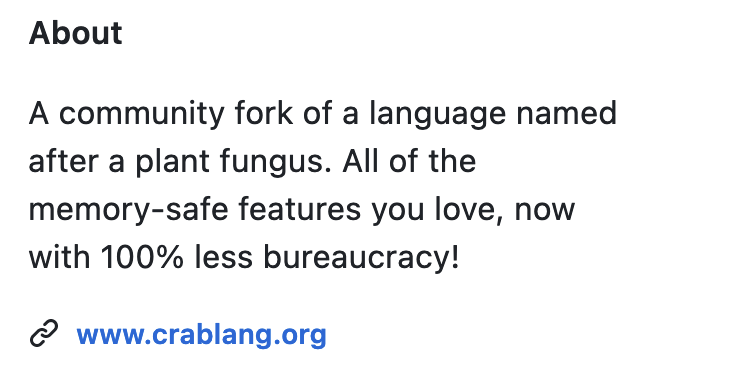↓Recommended Follow↓
Source: OSC Open Source Community (ID: oschina2013)
Rust is a programming language developed by Mozilla, primarily aimed at providing a safe, concurrent, and efficient programming experience. Rust’s strong typing and ownership system can prevent common programming errors such as memory leaks and data races. These features make Rust a very safe programming language, especially suitable for writing system-level software.Although the language itself has many advantages and is increasingly favored by developers, the internal chaos within Rust has been dragging down the development of the language.
Last month, the Rust Foundation sought community feedback on its updated trademark policy. The restrictions in the draft policy sparked widespread controversy, including a ban on using the word “Rust” in the names of tools related to Rust or software written in Rust, and even targeted restrictions in domain names or subdomains. Although it is just a draft, it has raised concerns.
Of course, some people not only expressed concerns but also forked the Rust language to create a community branch called CrabLang. In their introduction, CrabLang states:
All the memory safety features you love, now 100% free of any bureaucracy.
 On the official website of CrabLang, they state that the creation of this community branch is a response to the growing concerns about the impact on businesses and the restrictive trademark policy proposed by the foundation.In simple terms, it is to avoid using the term “Rust”—in opposition to the aforementioned draft trademark policy.
On the official website of CrabLang, they state that the creation of this community branch is a response to the growing concerns about the impact on businesses and the restrictive trademark policy proposed by the foundation.In simple terms, it is to avoid using the term “Rust”—in opposition to the aforementioned draft trademark policy.
While the document drafted by the Rust Foundation is indeed the reason for the creation of this community branch, it is a “too little, too late” solution to a problem that has existed for some time, attempting to address many issues that have been around for a while.
 CrabLang Logo: Rust mascot holding a knife
CrabLang Logo: Rust mascot holding a knife
CrabLang emphasizes that they do not intend to replace the language that everyone loves. If you are satisfied with the current state of Rust, they encourage you to continue using your chosen language.
Their goal is not to split the community but to provide an alternative for those who share the same concerns and wish to use, create, and promote the language more freely without worrying about trademark infringement lawsuits.CrabLang is not opposed to Rust, and the main branch of the fork will continue to stay in sync with the upstream codebase, aiming to provide a space for the community to thrive without corporate interests limiting them.
We just want to retain the ability to create content and promote its name, logo, and other assets while using it, without being restricted by trademark policies. By providing a community-driven alternative, we hope to maintain a spirit of collaboration, innovation, and creative freedom.
Even so, CrabLang stated on their official website:
We acknowledge and appreciate the efforts and financial support that businesses have contributed to the original project. We understand the importance of their contributions, but we also believe that it is crucial to maintain a balance between corporate influence and community will.
Project official website: https://crablang.org/Project address: https://github.com/crablang/crabIn addition to the newly created CrabLang branch, another recent event in the Rust community has once again highlighted its internal governance chaos.Recently, a series of events in the Rust community have attracted widespread attention and discussion. The events involved the RustConf conference organizers’ “last-minute notice” that a guest speaker’s talk had been downgraded, leading to the resignation of core team members from Rust.Originally, guest JeanHeyd Meneide was invited to give a keynote speech at RustConf 2023, sharing his and his team’s research on the possible future of compile-time programming. However, after he prepared his speech, the organizers suddenly notified him that his talk had been downgraded from a keynote to a regular talk.This caused dissatisfaction and confusion for JeanHeyd Meneide, as he believed he had clearly stated that the content of the speech was not an official position but an experimental proposal that would not confuse attendees. Secondly, he felt that the downgrade notification was unfair and stated that he would withdraw from RustConf 2023 and no longer give the speech. Jonathan Turner, a core member of Rust who recommended JeanHeyd Meneide as a keynote speaker, protested upon learning this news and immediately resigned in protest. As a core member, Jonathan Turner joined the Rust team back in 2016.
Jonathan Turner, a core member of Rust who recommended JeanHeyd Meneide as a keynote speaker, protested upon learning this news and immediately resigned in protest. As a core member, Jonathan Turner joined the Rust team back in 2016. These events have sparked widespread discussion on social media and within the developer community. Some have expressed concerns about the chaotic governance mechanism of the Rust community, believing it could damage the reputation and development of the Rust language.In fact, just over two months prior, the Rust team announced a new governance draft, but so far, this draft does not seem to have made significant improvements to community governance.
These events have sparked widespread discussion on social media and within the developer community. Some have expressed concerns about the chaotic governance mechanism of the Rust community, believing it could damage the reputation and development of the Rust language.In fact, just over two months prior, the Rust team announced a new governance draft, but so far, this draft does not seem to have made significant improvements to community governance.
– EOF –
Add the WeChat of the homepage, not only Linux skills +1

The homepage will also regularly share Linux-relatedtools,resources and selectedtechnical articles, and occasionally share some interesting activities, job referrals and how to use technology for side projects

Add WeChat to open a window
Recommended Reading Click the title to jump
1. Porting sudo and su to Rust, is Rust rewriting everything?
2. Red Hat abandons LibreOffice
3. Super beautiful Shell
Did you gain something from reading this article? Please share it with more people
Recommended follow “Linux Enthusiasts” to enhance Linux skills
Likes and views are the biggest support ❤️